- Features
- Screenshots
- Drivers
- Installation
- Usage
- Use Email Settings
- Add Custom Driver
- Register Custom Type
- Register Custom Action
- Register Custom User Type
- User Alerts Resource Hooks
- Custom Resource Classes
- Publish Assets
- Testing
- Code Style
- PHPStan
- Other Filament Packages
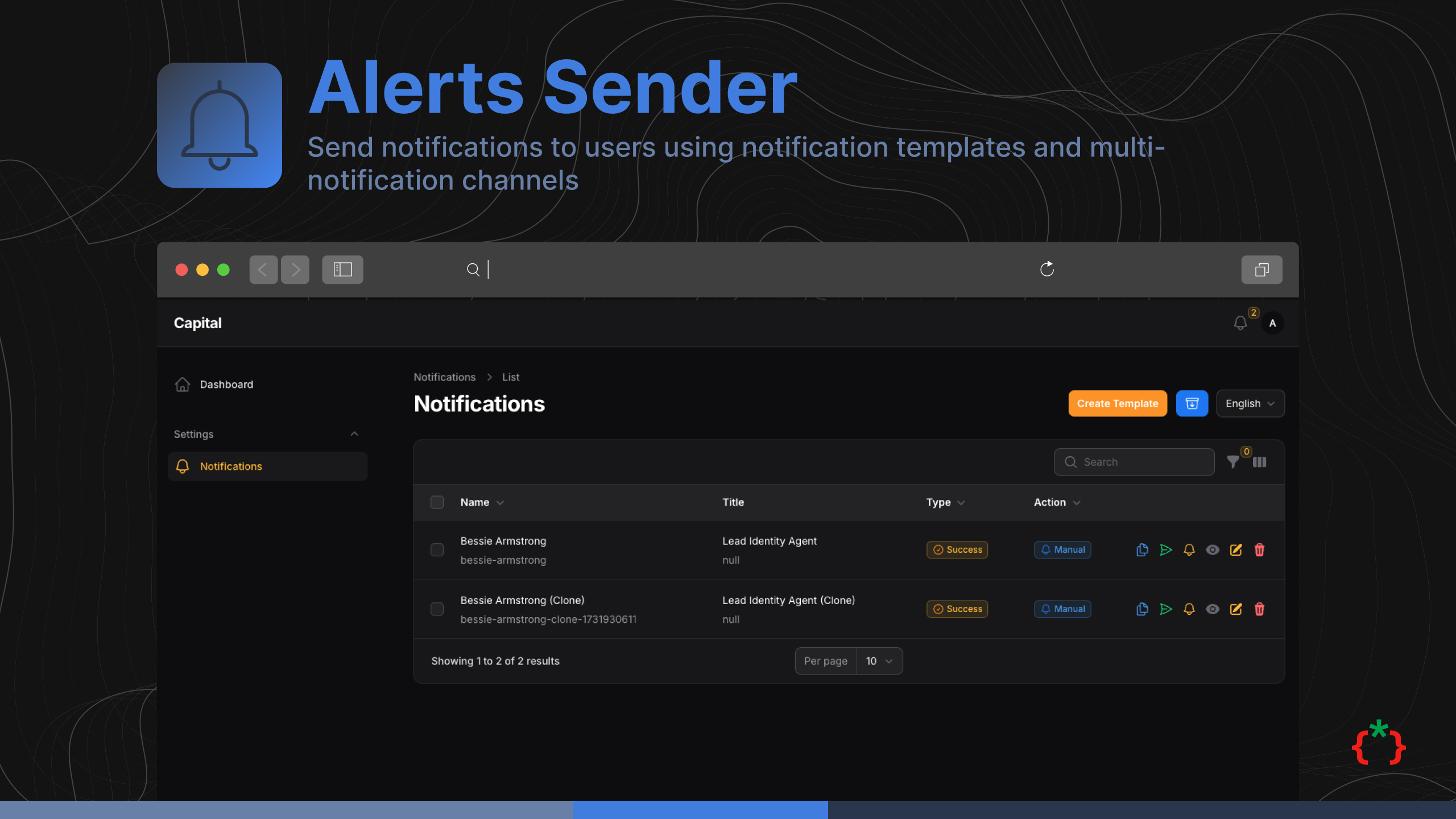
Send notification to users using notification templates and multi notification channels, it's support Filament Native Notification Service with macro, and a full integration to FCM service worker notifications
#Features
- [x] Send Notification to users using drivers
- [x] Use Filament Native Notification
- [x] Use Notification Templates
- [x] Notification Logs
- [x] Use Multiple Notification Channels
- [x] Hide Notifications Resources
- [x] Use Database Driver
- [x] Use Email Driver
- [x] Custom Driver Register
- [x] Custom Type Register
- [x] Custom Action Register
- [x] Multi Users Register
- [ ] Register Notification Templates
#Screenshots

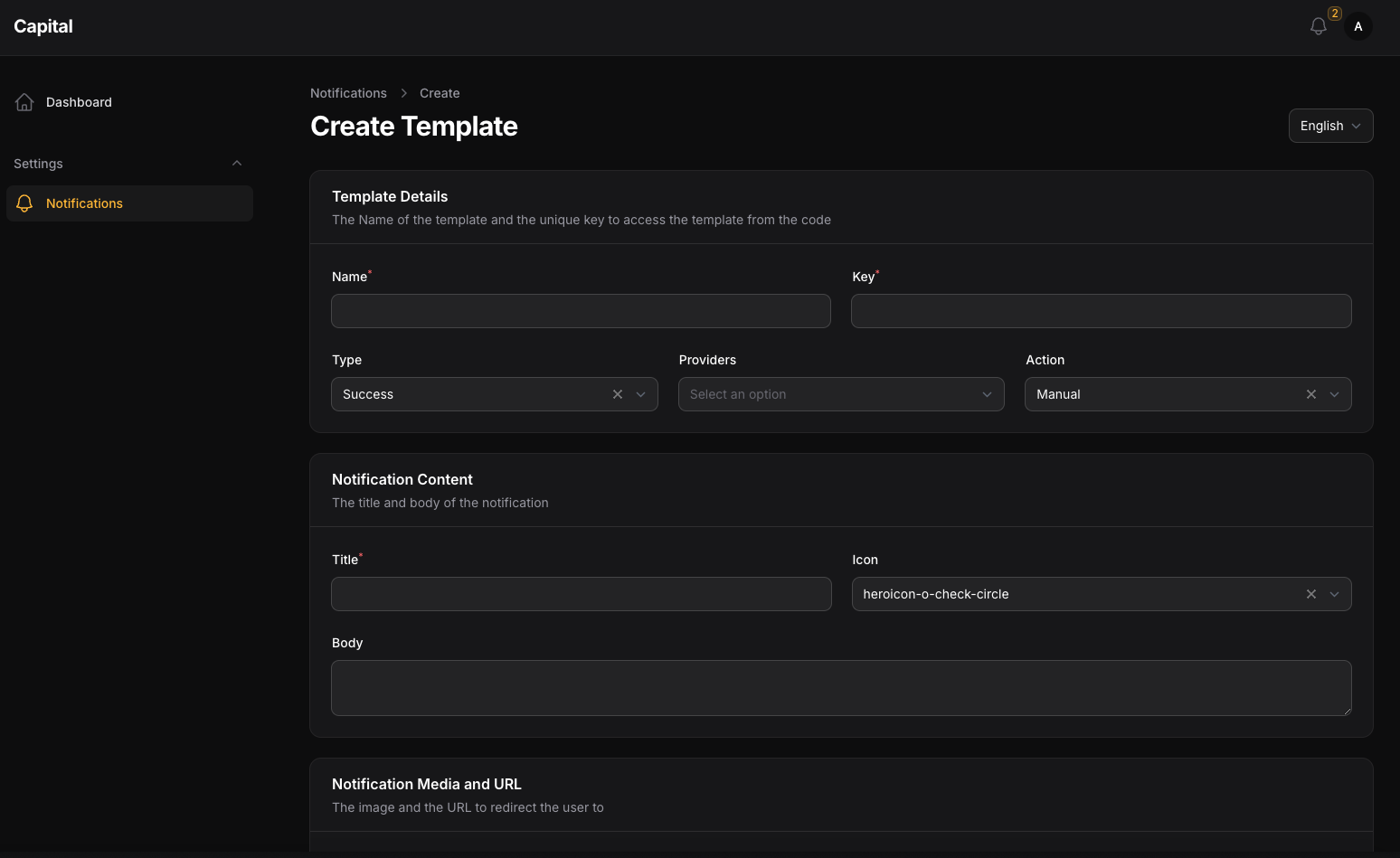
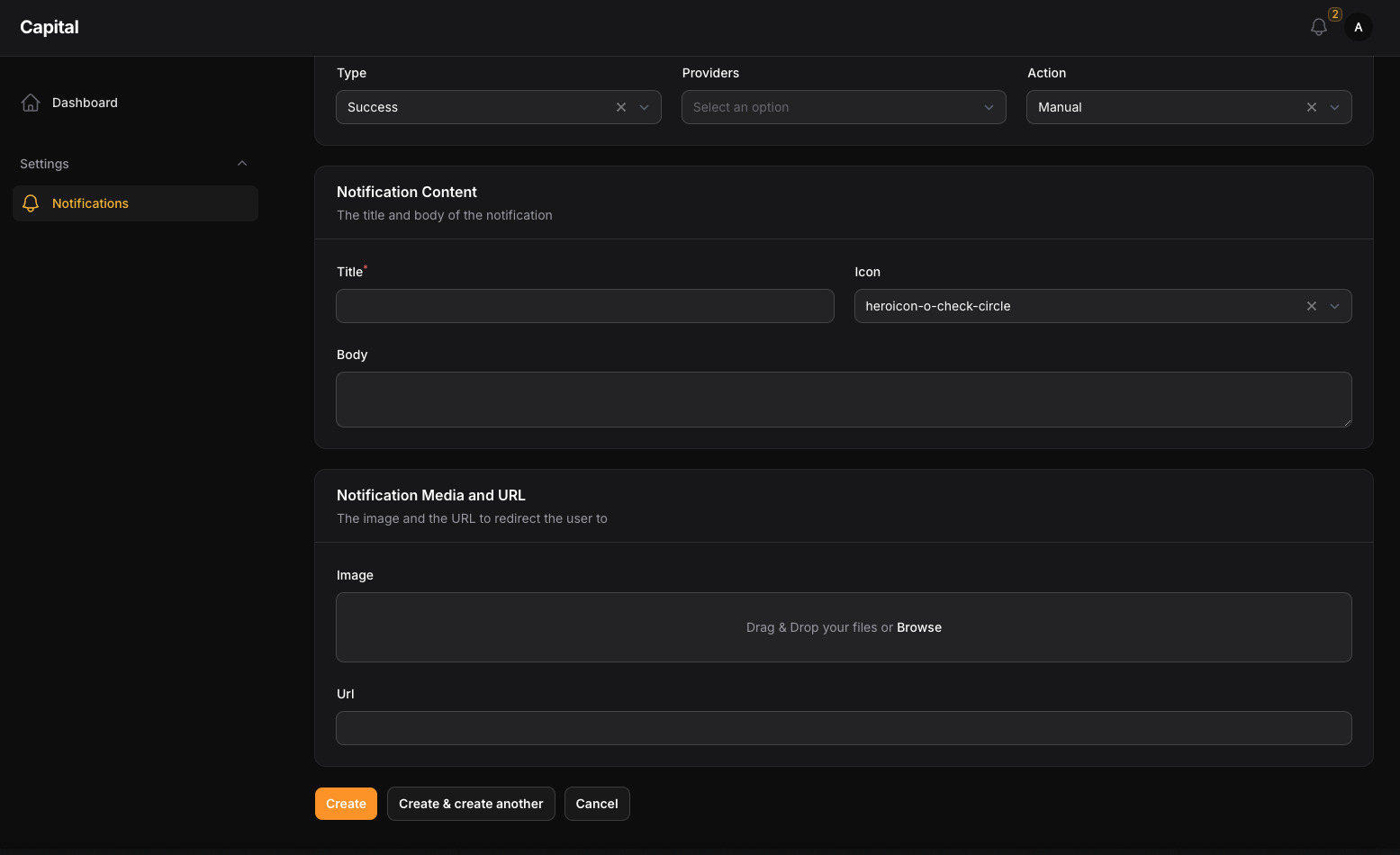
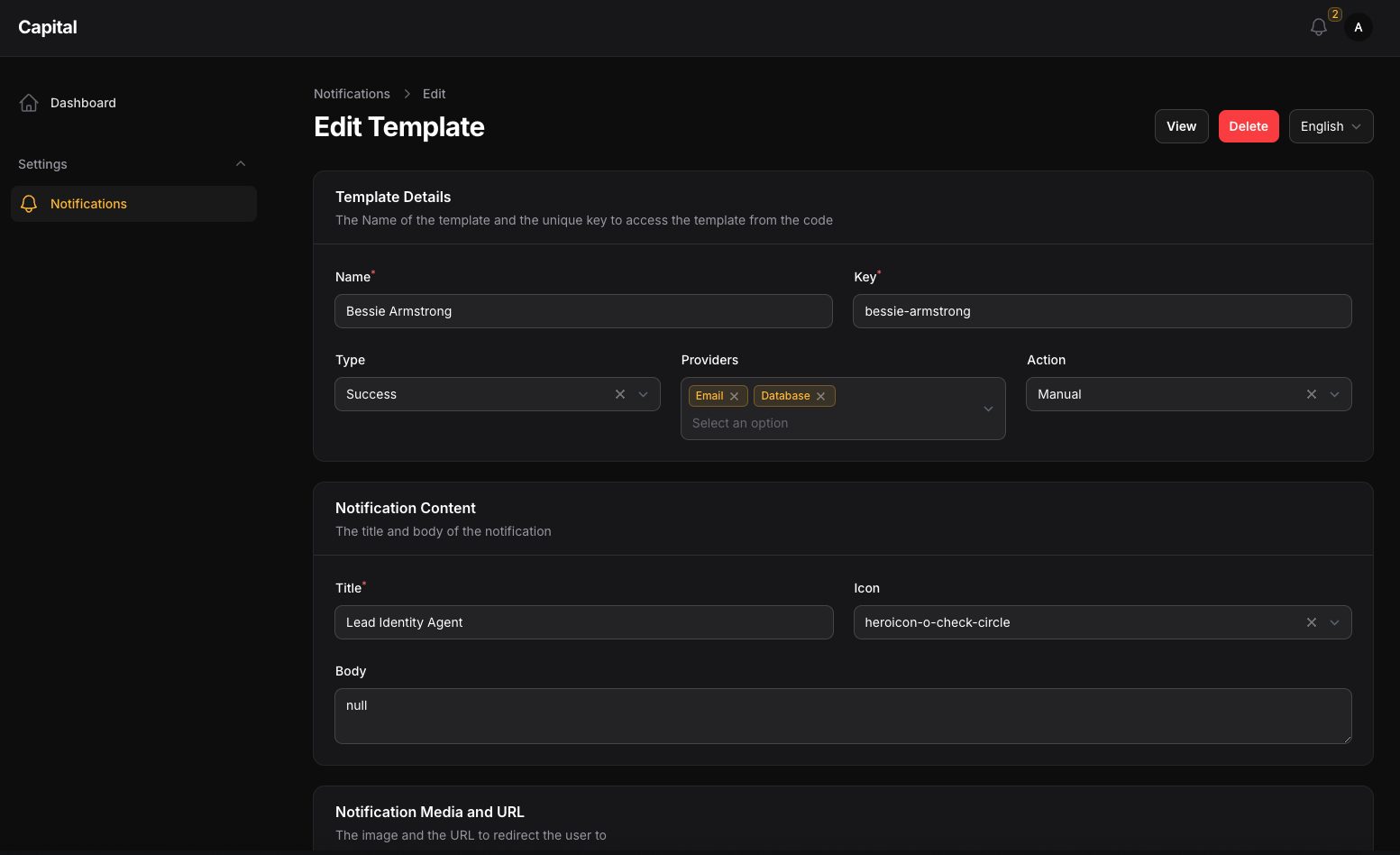



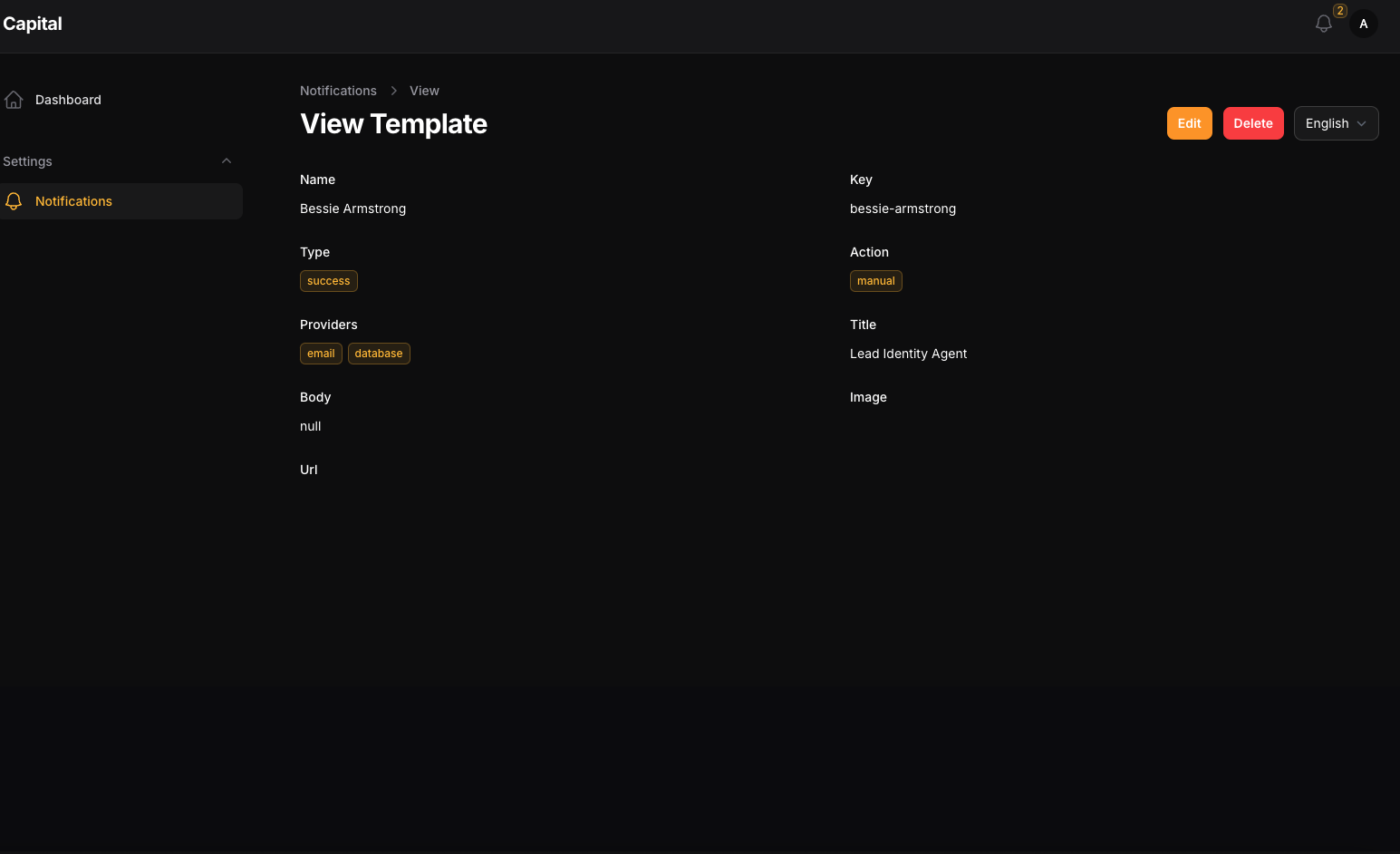
#Drivers
we have ready to use drivers for the Filament Alerts you can check
#Installation
composer require tomatophp/filament-alertsafter install your package please run this command
php artisan filament-alerts:installif you are not using this package as a plugin please register the plugin on /app/Providers/Filament/AdminPanelProvider.php
->plugin(\TomatoPHP\FilamentAlerts\FilamentAlertsPlugin::make())#Usage
to set up any model to get notifications you
<?php namespace App\Models; use Illuminate\Contracts\Auth\MustVerifyEmail;use Illuminate\Database\Eloquent\Factories\HasFactory;use Illuminate\Foundation\Auth\User as Authenticatable;use Illuminate\Notifications\Notifiable;use Laravel\Fortify\TwoFactorAuthenticatable;use Laravel\Jetstream\HasProfilePhoto;use Laravel\Sanctum\HasApiTokens;use Spatie\Permission\Traits\HasRoles;use TomatoPHP\FilamentAlerts\Traits\InteractsWithNotifications; class User extends Authenticatable{ use HasApiTokens; use HasFactory; use HasProfilePhoto; use Notifiable; use TwoFactorAuthenticatable; use HasRoles; use InteractsWithNotifications; ...#Queue
the notification is run on queue, so you must run the queue worker to send the notifications
php artisan queue:work#Use Filament Native Notification
you can use the filament native notification and we add some macro for you
use Filament\Notifications\Notification; Notification::make('send') ->title('Test Notifications') ->body('This is a test notification') ->icon('heroicon-o-bell') ->color('success') ->actions([ \Filament\Notifications\Actions\Action::make('view') ->label('View') ->url('https://google.com') ->markAsRead() ]) ->sendUse(auth()->user(), \TomatoPHP\FilamentAlerts\Services\Drivers\EmailDriver::class);#Notification Service
to create a new template you can use template CRUD and make sure that the template key is unique because you will use it on every single notification.
#Send Notification
to send a notification you must use our helper SendNotification::class like
use TomatoPHP\FilamentAlerts\Facades\FilamentAlerts; FilamentAlerts::notify(User::first()) ->template($template->id) ->title([ "find-text" => "change with this" ]) ->body([ "find-text" => "change with this" ]) ->send();where $template is selected of the template by key or id, and title, body use to select and replace string on the template with custom data
#Notification Channels
you can use multiple notification channels like
- Database
- Discord
- Firebase Cloud Messages
it can be working with direct user methods like
$user->notifyEmail(string $message, ?string $subject = null, ?string $url = null);$user->notifyDB(string $message, ?string $title=null, ?string $url =null);#Hide Notifications Resources
to hide the notification resources from the sidebar you can use the plugin method hideNotificationsResources like
->plugin(\TomatoPHP\FilamentAlerts\FilamentAlertsPlugin::make() ->hideNotificationsResources())#Use Email Settings
we have build a Email settings to change your SMTP settings direct from GUI to allow this feature just add this method to the plugin
->plugin(\TomatoPHP\FilamentAlerts\FilamentAlertsPlugin::make() ->useSettingsHub())#Add Custom Driver
you can add a custom driver follow up Driver abstract class like this
<?php namespace TomatoPHP\FilamentAlerts\Services\Drivers; use Filament\Notifications\Notification;use TomatoPHP\FilamentAlerts\Jobs\NotifyDatabaseJob; class DatabaseDriver extends Driver{ public function setup(): void { // TODO: Implement setup() method. } public function sendIt( string $title, string $model, int | string | null $modelId = null, ?string $body = null, ?string $url = null, ?string $icon = null, ?string $image = null, ?string $type = 'info', ?string $action = 'system', ?array $data = [], ?int $template_id = null, ?Notification $notification = null ): void { if ($modelId) { dispatch(new NotifyDatabaseJob([ 'model_type' => $model, 'modelId' => $modelId, 'title' => $title, 'body' => $body, 'url' => $url, 'icon' => $icon, 'type' => $type, 'action' => $action, 'data' => $data, 'template_id' => $template_id, ])); } else { foreach ($model::all() as $user) { dispatch(new NotifyDatabaseJob([ 'model_type' => $model, 'modelId' => $user->id, 'title' => $title, 'body' => $body, 'url' => $url, 'icon' => $icon, 'type' => $type, 'action' => $action, 'data' => $data, 'template_id' => $template_id, ])); } } }}then just use the facade service method in your service provider boot()
use TomatoPHP\FilamentAlerts\Facades\FilamentAlerts; public function boot() { FilamentAlerts::register( \TomatoPHP\FilamentAlerts\Services\Concerns\NotificationDriver::make('database') ->label('Database') ->color('primary') ->icon('heroicon-o-bell') ->driver(\TomatoPHP\FilamentAlerts\Services\Drivers\DatabaseDriver::class) );}#Register Custom Type
you can add a custom type using facade service method in your service provider boot()
use TomatoPHP\FilamentAlerts\Facades\FilamentAlerts; public function boot() { FilamentAlerts::register( \TomatoPHP\FilamentAlerts\Services\Concerns\NotificationType::make('system') ->label('System') ->color('primary') ->icon('heroicon-o-bell') );}#Register Custom Action
you can add a custom action using facade service method in your service provider boot()
use TomatoPHP\FilamentAlerts\Facades\FilamentAlerts; public function boot() { FilamentAlerts::register( \TomatoPHP\FilamentAlerts\Services\Concerns\NotificationAction::make('system') ->label('System') ->color('primary') ->icon('heroicon-o-bell') );}#Register Custom User Type
you can add a custom user type using facade service method in your service provider boot()
use TomatoPHP\FilamentAlerts\Facades\FilamentAlerts; public function boot() { FilamentAlerts::register( \TomatoPHP\FilamentAlerts\Services\Concerns\NotificationUser::make(User::class) ->label('User') ->color('primary') ->icon('heroicon-o-bell') );}#User Alerts Resource Hooks
we have add a lot of hooks to make it easy to attach actions, columns, filters, etc
#Table Columns
use TomatoPHP\FilamentAlerts\Filament\Resources\NotificationsTemplateResource\Table\NotificationsTemplateTable; public function boot(){ NotificationsTemplateTable::register([ \Filament\Tables\Columns\TextColumn::make('something') ]);}#Table Actions
use TomatoPHP\FilamentAlerts\Filament\Resources\NotificationsTemplateResource\Table\NotificationsTemplateActions; public function boot(){ NotificationsTemplateActions::register([ \Filament\Tables\Actions\ReplicateAction::make() ]);}#Table Filters
use TomatoPHP\FilamentAlerts\Filament\Resources\NotificationsTemplateResource\Table\NotificationsTemplateFilters; public function boot(){ NotificationsTemplateFilters::register([ \Filament\Tables\Filters\SelectFilter::make('something') ]);}#Table Bulk Actions
use TomatoPHP\FilamentAlerts\Filament\Resources\NotificationsTemplateResource\Table\NotificationsTemplateBulkActions; public function boot(){ NotificationsTemplateBulkActions::register([ \Filament\Tables\BulkActions\DeleteAction::make() ]);}#From Components
use TomatoPHP\FilamentAlerts\Filament\Resources\NotificationsTemplateResource\Form\NotificationsTemplateForm; public function boot(){ NotificationsTemplateForm::register([ \Filament\Forms\Components\TextInput::make('something') ]);}#Page Actions
use TomatoPHP\FilamentAlerts\Facades\FilamentAlerts;use TomatoPHP\FilamentAlerts\Filament\Resources\NotificationsTemplateResource\Pages\ListNotificationsTemplates; public function boot(){ FilamentAlerts::registerAction(action: [ Filament\Actions\Action::make('action') ], page: ListNotificationsTemplates::class);}#Infolist Entries
use TomatoPHP\FilamentAlerts\Filament\Resources\NotificationsTemplateResource\Infolist\NotificationsTemplateInfoList; public function boot(){ NotificationsTemplateInfoList::register([ \Filament\Infolists\Components\TextEntry::make('something') ]);}#Custom Resource Classes
you can customize all resource classes to be any class you want with the same return from the config file
/** * --------------------------------------------- * Resource Building * --------------------------------------------- * if you want to use the resource custom class */'resource' => [ 'table' => [ 'class' => \TomatoPHP\FilamentAlerts\Filament\Resources\NotificationsTemplateResource\Table\NotificationsTemplateTable::class, 'filters' => \TomatoPHP\FilamentAlerts\Filament\Resources\NotificationsTemplateResource\Table\NotificationsTemplateFilters::class, 'actions' => \TomatoPHP\FilamentAlerts\Filament\Resources\NotificationsTemplateResource\Table\NotificationsTemplateActions::class, 'header-actions' => \TomatoPHP\FilamentAlerts\Filament\Resources\NotificationsTemplateResource\Table\NotificationsTemplateHeaderActions::class, 'bulkActions' => \TomatoPHP\FilamentAlerts\Filament\Resources\NotificationsTemplateResource\Table\NotificationsTemplateBulkActions::class, ], 'form' => [ 'class' => \TomatoPHP\FilamentAlerts\Filament\Resources\NotificationsTemplateResource\Form\NotificationsTemplateForm::class, ], 'infolist' => [ 'class' => \TomatoPHP\FilamentAlerts\Filament\Resources\NotificationsTemplateResource\Infolist\NotificationsTemplateInfoList::class, ]]#Publish Assets
you can publish config file by use this command
php artisan vendor:publish --tag="filament-alerts-config"you can publish views file by use this command
php artisan vendor:publish --tag="filament-alerts-views"you can publish languages file by use this command
php artisan vendor:publish --tag="filament-alerts-lang"you can publish migrations file by use this command
php artisan vendor:publish --tag="filament-alerts-migrations"#Testing
if you like to run PEST testing just use this command
composer test#Code Style
if you like to fix the code style just use this command
composer format#PHPStan
if you like to check the code by PHPStan just use this command
composer analyse#Other Filament Packages
Checkout our Awesome TomatoPHP